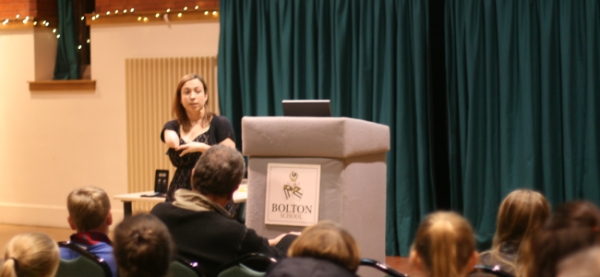"Sarah stood up and proudly showed her picture, her vision for her future."
It wasn't just your average speaker though, not for Sarah anyway. This speaker looked quite a bit like her - this person was also missing fingers and had a shortened arm - and she also told stories about her own experiences growing up and being bullied at Primary school. This speaker also had some medals to show to her audience, medals from the Paralympic Games. Sarah sat with tears in her eyes, enthralled by the sudden possibilities laid out before her - the visiting speaker looked like Sarah and yet she had had great success in life and firmly believed that all children, and especially children like Sarah, could achieve great success also.
Later that day Sarah and her class were asked to think about what they wanted to be when they grew up, and to either write about it or draw a picture. As Sarah sat and thought about her own future, she realised she felt inspired; grabbing some paper and her pencils, she started to draw. At the end of class the pupils were asked who would like to stand up and talk about their picture, and with a new sense of confidence, a feeling of beautiful self-belief emerging, Sarah stood up and proudly showed her picture, her vision for her future. On her piece of paper was a swimming pool, and in the pool she was swimming a race, a crowd cheered her on, and in the middle of the crowd were her parents, her siblings, and the Paralympic speaker who had inspired her. Sarah wanted to go to the Paralympics, and she now firmly believed that she could follow in the lady speaker’s footsteps.
Sarah wasn’t the only child inspired in that moment - the Paralympics, you see, is not just a vessel to inspire and motivate young people with disabilities, it is also a vessel to evoke possibility for all children - the belief that no matter what life throws at you, you can achieve what it is that you want to achieve. It reflects the resilience and growth mindset needed for success, in whatever form that success takes, ie academic results, sports achievements, family relationships, self-development. For children, disabled or not, to see someone go head-on with grit and determination, to do their best in their chosen speciality, can be nothing but a motivating influence.
It is these words, these skills that are the current buzzwords in the education world: resilience, growth mindset, grit, and determination. All words that embody the attitudes of elite athletes all over the world, but most revealed in the Paralympic Athlete. Already having a difficult start in life (or an illness or acquired disability in years after birth), Paralympic athletes innately embody resilience, grit, and determination, and through these skills naturally develop a growth mindset, a belief that in every setback there is a lesson to be learnt, a chance to move forward faster, bigger, better. In this growth mindset development, the focus turns to the inner world of the athlete, the power to master oneself in a continuous cycle, through the deep valleys of failure, to the tops of success mountains. These are the skills we want to develop in all of our pupils, the ability to take knocks in life, but then ultimately thrive.
"Understanding that life is full of obstacles, we can teach pupils to drive onwards."
The motto for the Paralympics is ‘Spirit in Motion’ - a concept that reflects this ability to grow and continuously create positive action towards change and achievement. To embed this concept, of spirit continuously moving forward, in children of all abilities is to awaken their potential, their possibilities. Within the roots of reality, the understanding that life is full of obstacles and tough times, we can teach pupils to drive onwards; these obstacles are but moments in time that are here one minute (or day, or week, or month) and gone the next, life is not static, but an unceasing cycle of movement, and we have the reigns within which we can control our forward, or backwards movement in life.
Introducing pupils to the Paralympics introduces them to the very embodiment of ‘Spirit in Motion’ and also illustrates the very ideals and skills we are trying to nurture in them, resilience and grit. By engaging pupils directly with the Paralympic experience, whether through the use of a speaker or by watching the games either live, or retrospectively, our young people can see that the impossible is possible, if you give yourself the chance to learn and grow and thrive with each challenge that arises. Whether your pupils have disabilities or not, whether they struggle with self-belief, or a strong sense of self, the Paralympics is a perfect way to show them that life is life, and that you yourself are responsible for your achievements and success.
*Sarah is an amalgamation of young pupils with disabilities across a cross section of Yorkshire Primary Schools
.
Has your school ever been visited by a Paralympian? Share your stories below!


















